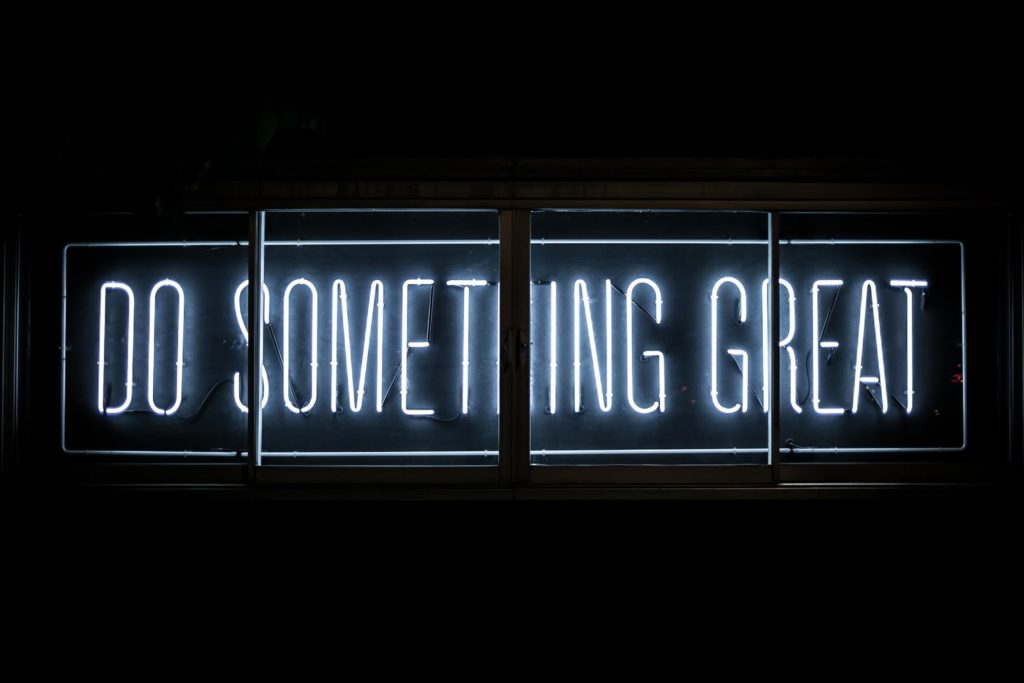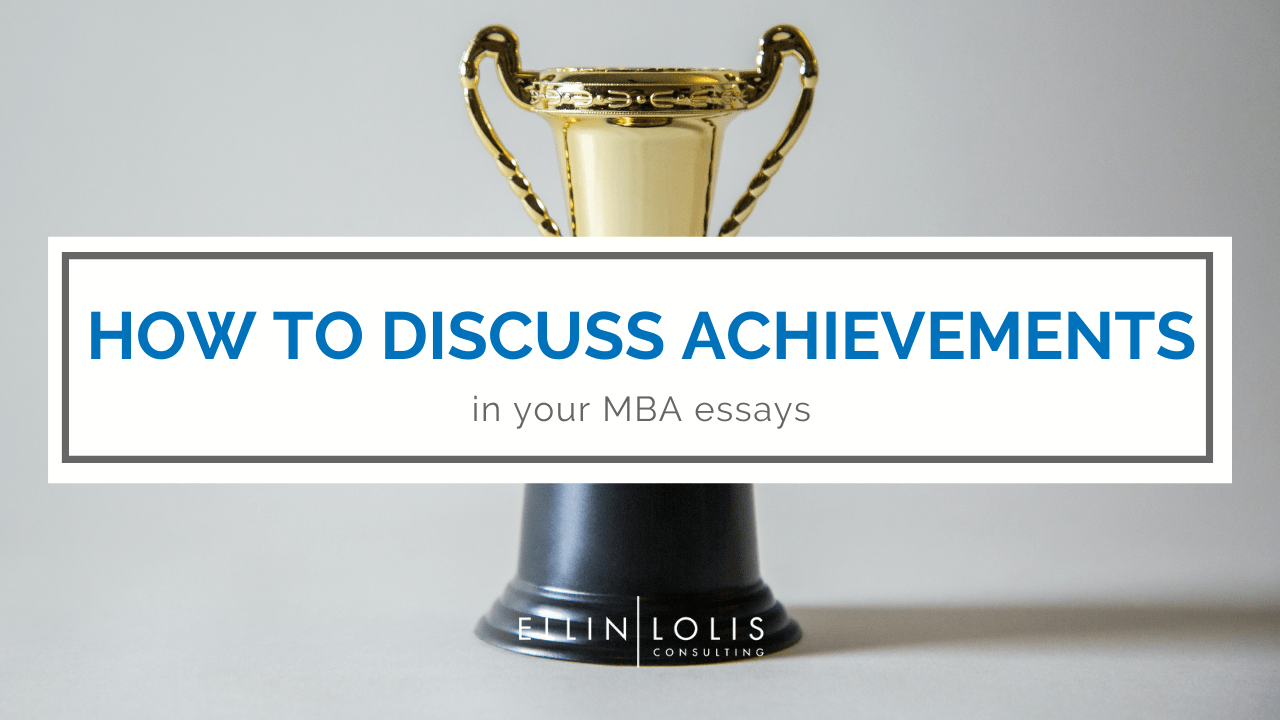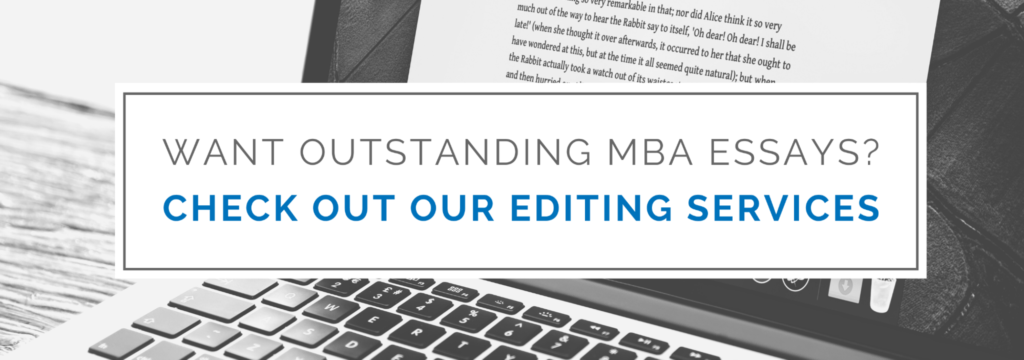UPDATE: This article was originally posted on June 22, 2018. It has been updated with new information and tips below.
The MBA admissions process is no moment for humility.
With thousands of highly qualified applicants from around the world vying for a limited number of spots, your main objective during the application process is to stand out.
Succeed in this endeavor, and you’ll find yourself joining the ranks of the world’s elite business schools.
Fail, and you’ll find yourself on a waitlist or, worse, not admitted anywhere at all.
Though there are many types of essays (like the ubiquitous “Goals Essay”) in which you will need to justify your fit with a prestigious MBA, some of the most important essays you will write are those in which you describe your achievements — what better way to learn about your greatest hits?
Nonetheless, writing a standout achievement essay requires much more than sitting down to your computer and writing a stream of consciousness account of your career highlights.
Instead, it requires careful selection and crafting to ensure your stories really sell you.
To help you succeed in this task, this post covers best practices for writing your achievement essay, including excerpts of successful and not-so-successful attempts at tackling this critical part of your MBA applications.
1. Reflect on your best examples
Over your career, you’ve likely had a lot of wins — both big and small.
Though you’re hopefully nodding your head in agreement, when was the last time you really reflected on which of your achievements are your strongest?

Most of our clients are extremely ambitious, forward-looking people, however, writing your MBA essays requires keeping one eye on the future and the other on the past.
That’s why, before you start writing the first word of your achievements essay, you should take the time to compile a list of your top stories.
What makes a good example?
In general, clients make the mistake of thinking that the only examples they can include in essays are those in which they helped establish one of Africa’s first private equity firms, created the world’s first mind-controlled jet pack, or developed a cure for cancer.
Though these are certainly all incredible achievements, your best example doesn’t necessarily have to be so big.
For example, while brainstorming his essay topics, a recent client was struggling with the fact that his corporate finance job felt to him like a lot of financial reports and Excel spreadsheets.
However, when we dug into the details, he told us that he’d led the process to help his company negotiate better terms with a foreign government to ensure they were able to continue offering affordable protein in that country.
Bingo!
Not only did this example show his ability to negotiate and communicate across cultures, he was also able to show how he generated meaningful results for his company and positively impacted people in an entire country.
That’s a pretty great example!
Go back and think of all the moments of your career you are proudest of. In the rest of the article, we’ll talk about the importance of filtering these examples based on your personal brand and based on which are more suitable for story formats, so write down as many as you can!
2. Keep your personal brand in mind

We recently worked with a client who was applying to business school in order to advance her consulting career at one of the world’s Top 3 firms. After reviewing her background through our personal branding process, we noticed that she was unusually committed to social impact.
From having founded an organization that raised money for research on terminal diseases before her 14th birthday, to the student solidarity organization she founded during university, to the diversity initiative she leads at her current organization, it was clear Amanda was committed to social impact.
As such, her personal brand centered around focusing her consulting career on this topic.
When deciding on Amanda’s theme for her first achievement essay, we thus decided to choose an example that not only led to an amazing outcome, but that showed her putting her passion for social impact into action.
Though Amanda had obtained awesome results on financial services and operations cases, these were less connected to her brand and, as a result, were discarded from our consideration.
You should do the same in your essays. Though you may have many achievements that led to awesome results, choose the ones that best reinforce the image you are presenting to the schools.
Remember: consistency is king.
3. The STAR method
STAR stands for Situation – Task – Action – Result.
The framework will help you write a clear, compelling answer that provides background, tells exactly what you did, and ends with a big reveal.
Here’s how it works:
- Situation – Begin with setting the stage and presenting the complication or conflict of the story. For example: “My brand was losing market share to a new competitor”
- Task – Identify your objective in light of the complication and summarize the task or project performed: “I decided to revise our strategy”
- Action – Describe the action steps you took toward your goal: “I surveyed customers to learn what traits they valued and implemented product changes accordingly”
- Results – Summarize the outcome and how you and/or your team made a difference: “We gained 20 additional market share.”
The STAR method makes it very easy for your reader not only to understand what took place but to also see your role in all of it — important given the fact that it’s you and not your team or company that’s applying for an MBA.
Not convinced you should follow this method? Check out the two stories below. Which does a better job of clearly showing the applicant’s strengths and achievements?
My greatest achievement in life so far has come from my study effort. It was one of the best days of my life when I got the news I was chosen for a scholarship from the Brazilian government to start a project in University of Texas. From this episode I learned that the long run counts a lot because this scholarship didn’t depend on taking a test and having a great day on it. It was awarded to students who had an English proficiency diploma at a specific point in time and a great college record. In Texas, I was forced to become a more independent man and I had the chance to connect with so many people with so many different backgrounds that I can say my desire to explore the world started there.
Or this one?
The achievement I’m most proud of happened recently. At my company, it had been three years since we had raised investments for a new fund, so finding a new opportunity was critical. In mid-December, that great opportunity arose, however, we’d be battling against an unbelievably short deadline to get the project approved.
Normally, at this time of year, we’re still fully staffed, but given the stagnant market, only one manager and myself remained. In addition, the fund’s investment policy relied on a strategy that we’d never used. Finally, I’d never worked on the public offering of a fund before.
Nonetheless, I knew that if the partner and I worked diligently to support each other, we could land this deal. Our first move was to organize a meeting to align all parties involved. Then, we divided tasks, and I took over coordinating stakeholders, assigning tasks and managing deliverables. In the end, we successfully delivered everything on time.
This experience made me more comfortable in a leadership position, as managing diverse stakeholders under pressure helped me better analyze what each brought to the table and execute accordingly. Recently, I’ve even been able to help other teams coordinate new offers. Finally, the project was a great opportunity to learn new management skills from my superior. This reinforced for me how important it will be to learn additional management frameworks at INSEAD and prepare myself to be a leader in the Private Equity market.
Though the first essay includes a tremendous achievement, the lack of structure and details makes it difficult for us to understand exactly what happened.
The second essay clearly states the facts and doesn’t forget that the S of STAR is one of the most important parts of any winning achievement essay.
In any good story, we need some sort of challenge for our protagonist to solve.
Would Breaking Bad have been as interesting if Walter White was already an established drug lord when the show started? Probably not. Watching him take the news of his cancer diagnosis and find an unusual way to drum up the money for treatment is just what makes the show so addictive.
Conflict and how our “hero” (in this case, you!) solves the challenge is at the core of any good story, so make sure you use the STAR method to clearly set up the conflict you needed to navigate and then show how you took steps to turn this roadblock into your greatest achievement.
4. Stay focused
When writing your achievement essay, remember that you’re telling the story of the war through the eyes of a soldier — meaning you’re showing who you are as a professional with one, clear representative example.
This means sticking to one story.

The reason we have focused on telling one anecdote or story is because that’s all you have room for.
An achievements essay is not meant to repeat your CV, nor is it a good place to squeeze in a summary of your life – or even a summary of one year! Choose one moment, one situation, one idea, and follow it all the way through.
A quick note: make sure this one point answers the question being asked.
Some universities ask very open-ended questions that give you all kinds of freedom when writing, but many use more specific prompts. Before you start writing, all throughout the process, and after you think you’re finished, make sure that you are clearly answering the question.
You should also make sure you focus on demonstrating a specific set of strengths.
Though many achievements are open-ended enough for you to demonstrate 10 different skills MBAs highly value, including all 10 means you won’t have enough evidence to prove you truly possess these capabilities.
In any good essay, we need a reason to believe you have the skills and strengths you claim to possess. The only way to give your reader this evidence is to show rather than tell.
If you try to cram too much in, you simply won’t have the word count to fully justify all your strengths, resulting in a shallow, ineffective essay that will fall short of selling you to elite business schools.
5. Example MBA essay questions on achievements
So now that you’ve thought about your best achievements and know how to present them, what types of MBA essay questions can you actually expect to answer this way?
Though there are many schools that ask about your greatest hits, one of the schools that solicits an achievements essay most directly is INSEAD.
INSEAD’s Motivation Essay 2 asks you to “Describe the achievement of which you are most proud and explain why. In addition, describe a situation where you failed. How did these experiences impact your relationships with others? Comment on what you learned. (approximately 400 words)”
Considering that you’re tasked with presenting the achievement of which you are the proudest, you must be absolutely certain that you are choosing an example that shows the admissions committee your most relevant positive attributes.
Choosing a relatively recent example (unless you really have a show-stopper from earlier in your career) is also generally preferable.
Furthermore, since you’ll need to discuss one failure, one achievement and what you learned from both in just 400 words, it’s extremely important to stay focused on one achievement and use the STAR method to quickly yet efficiently guide the reader through your essay.
For more info on how to write INSEAD essays in a manner that secures your place in their highly-coveted 1-year MBA, check out our INSEAD essay analysis!
Unlike INSEAD’s direct question, these schools’ essays can be thought of as achievements essays in disguise!
Though Harvard changes its essay prompt each year, the core directive year after year is to show the admissions committee who you are and what you can contribute to the HBS community by discussing your previous achievements.
Let’s take their essay question, for example.

SOURCE: Harvard Business School
Though you may be tempted just to reiterate your CV, this essay works best when you choose a clear theme and present various related achievements in your life to prove your thesis.
For example, a recent client who came from an underprivileged background and beat the odds to land a top consulting job before moving to government-centered his essay around dreaming big and turning these dreams into a reality.
He then told stories of how he was the first of his family to attend an elite university, how he partnered with the Chilean government to overhaul their healthcare programs, and finally, how he reshaped his state governor’s entire internal transportation strategy to free up resources and redirect them towards initiatives that benefited the needy.
In the end, he had presented a compelling case that captured the admissions committee’s attention.
Other examples of this type of open-ended achievements essay include Stanford’s notorious “What matters most to you and why?”
TOP TIP: For the HBS, Stanford, and Booth essays mentioned above, you will need to break the “1-story” rule and will instead choose several complementary stories to highlight multiple accomplishments. All stories should be told using the STAR method and should reinforce your personal brand.
6. Make sure your story shines
Landing a spot at a top MBA program is no easy task.
You’ve spent years building a track record of professional success, dedicated yourself to getting a good GMAT score, and carefully developed your application strategy.

Now is the time to make sure your accomplishments truly shine, and the only way to do so is to write a clear, compelling admissions essay.
Ellin Lolis Consulting began with one mission: provide the best possible service to our clients and get them the best possible results.
Serving our customers is at the core of our company, and we know that applying for an MBA can be a difficult, long process, but our goal is to take away as much of the stress as possible by acting as your ally in the process.
So if you need much more than just a few comments on your essay, but instead want focused help shaping how you present your life’s greatest hits to one of the world’s toughest critics, you can count on us.
In the words of our client Henrique, who was admitted to IESE’s MBA program:
“Ellin helped me in the application process since the beginning on how to organize myself for the whole year. I truly believe that my interactions with her not only provided a foundation for the application creation, but also, and more importantly, structured my life at business school. I even got a scholarship. I really recommend her since she is really committed, hard-working made me feel comfortable and confident during the entire process. Thanks for the phenomenal service, Ellin.”
Get in touch and let our award-winning team o writers and storytellers help you make an unforgettable first impression.
Real MBA Essays That Got People In
School-specific sample essays that got our clients accepted






